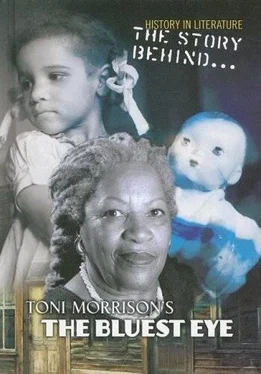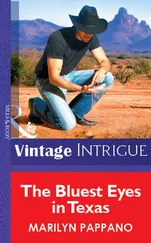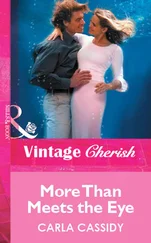There stood two white men. One with a spirit lamp, the other with a flashlight. There was no mistake about their being white; he could smell it. Cholly jumped, trying to kneel, stand, and get his pants up all in one motion. The men had long guns. "Hee hee hee heeeee." The snicker was a long asthmatic cough. The other raced the flashlight all over Cholly and Darlene. "Get on wid it, nigger," said the flashlight one. "Sir?" said Cholly, trying to find a buttonhole. "I said, get on wid it. An' make it good, nigger, make it good." There was no place for Cholly's eyes to go. They slid about furtively searching for shelter, while his body remained paralyzed. The flashlight man lifted his gun down from his shoulder, and Cholly heard the clop of metal. He dropped back to his knees. Darlene had her head averted, her eyes staring out of the lamplight into the surrounding darkness and looking almost unconcerned, as though they had no part in the drama taking place around them. With a violence born of total helplessness, he pulled her dress up, lowered his trousers and underwear. "Hee hee hee hee heeeeee." Darlene put her hands over her face as Cholly began to simulate what had gone on before. He could do no more than make-believe. The flashlight made a moon on his behind. "Hee hee hee hee heeee."
"Come on, coon. Faster.
You ain't doing nothing for her."
"Hee hee hee hee heeee."
Cholly, moving faster, looked at Darlene. He hated her. He almost wished he could do it-hard, long, and painfully, he hated her so much. The flashlight wormed its way into his guts and turned the sweet taste of muscadine into rotten fetid bile. He stared at Darlene's hands covering her face in the moon and lamplight. They looked like baby claws. "Hee hee hee hee heee."
Some dogs howled. "Thas them. Thas them. I know thas Old Honey."
"Yep," said the spirit lamp. "Come on." The flashlight turned away, and one of them whistled to Honey. -"Wait," said the spirit lamp, "the coon ain't comed yet."
"Well, he have to come on his own time. Good luck, coon baby." They crushed the pine needles underfoot. Cholly could hear them whistling for a long time, and then the dogs' answer no longer a howl, but warm excited yelps of recognition. Cholly raised himself and in silence buttoned his trousers. Darlene did not move. Cholly wanted to strangle her, but instead he touched her leg with his foot. "We got to get, girl. Come on!" She reached for her underwear with her eyes closed, and could not find them. The two of them patted about in the moonlight for the panties. When she found them, she put them on with the movements of an old woman.
They walked away from the pine woods toward the road. He in front, she plopping along behind. It started to rain. "That's good," Cholly thought. "It will explain away our clothes." When they got back to the house, some ten or twelve guests were still there. Jake was gone, Suky too. Some people had gone back for more helpings of food-potato pie, ribs. All were engrossed in early-night reminiscences about dreams, figures, premonitions.
Their stuffed comfort was narcotic and had produced recollections and fabrications of hallucinations. Cholly and Darlene's entrance produced only a mild stir. "Ya'll soaked, ain't you?" Darlene's mother was only vaguely fussy. She had eaten and drunk too much.
Her shoes were under her chair, and the side snaps of her dress were opened. "Girl. Come on in here. Thought I told you…"
Some of the guests thought they would wait for the rain to slacken. Others, who had come in wagons, thought they'd best leave now. Cholly went into the little storeroom which had been made into a bed room for him. Three infants were sleeping on his cot. He took off his rain- and pine-soaked clothes and put on his coveralls. He didn't know where to go. Aunt Jimmy's room was out of the question, and Uncle O. V. and his wife would be using it later anyway. He took a quilt from a trunk, spread it on the floor, and lay down. Somebody was brewing coffee, and he had a sharp craving for it, just before falling asleep. The next day was cleaning-out day, settling accounts, distributing Aunt Jimmy's goods. Mouths were set in downward crescents, eyes veiled, feet tentative.
Cholly floated about aimlessly, doing chores as he was told. All the glamour and warmth the adults had given him on the previous day were replaced by a sharpness that agreed with his mood. He could think only of the flashlight, the muscadines, and Darlene's hands. And when he was not thinking of them, the vacancy in his head was like the space left by a newly pulled tooth still conscious of the rottenness that had once filled it. Afraid of running into Darlene, he would not go far from the house, but neither could he endure the atmosphere of his dead Aunt's house.
The picking through her things, the comments on the "condition" of her goods. Sullen, irritable, he cultivated his hatred of Darlene. Never did he once consider directing his hatred toward the hunters. Such an emotion would have destroyed him. They were big, white, armed men. He was small, black, helpless. His subconscious knew what his conscious mind did not guess-that hating them would have consumed him, burned him up like a piece of soft coal, leaving only flakes of ash and a question mark of smoke. He was, in time, to discover that hatred of white men-but not now. Not in impotence but later, when the hatred could find sweet expression. For now, he hated the one who had created the situation, the one who bore witness to his failure, his impotence. The one whom he had not been able to protect, to spare, to cover from the round moon glow of the flashlight. The hee-hee-hee's. He recalled Darlene's dripping hair ribbon, flapping against her face as they walked back in silence in the rain. The loathing that galloped through him made him tremble. There was no one to talk to. Old Blue was too drunk too often these days to make sense. Besides, Cholly doubted if he could reveal his shame to Blue. He would have to lie a little to tell Blue, Blue the woman-killer. It seemed to him that lonely was much better than alone. The day Cholly's uncle was ready to leave, when everything was packed, when the quarrels about who gets what had seethed down to a sticking gravy on everybody's tongue, Cholly sat on the back porch waiting. It had occurred to him that Darlene might be pregnant. It was a wildly irrational, completely uninformed idea, but the fear it produced was complete enough. He had to get away.
Never mind the fact that he was leaving that very day. A town or two away was not far enough, especially since he did not like or trust his uncle, and Darlene's mother could surely find him, and Uncle O. V. would turn him over to her. Cholly knew it was wrong to run out on a pregnant girl, and recalled, with sympathy, that his father had done just that. Now he understood. He knew then what he must do-find his father. His father would understand.
Aunt Jimmy said he had gone to Macon. With no more thought than a chick leaving its shell, he stepped off the porch. He had gotten a little way when he remembered the treasure; Aunt Jimmy had left something, and he had forgotten all about it. In a stove flue no longer used, she had hidden a little meal bag which she called her treasure. He slipped into the house and found the room empty.
Digging into the flue, he encountered webs and soot, and then the soft bag. He sorted the money; fourteen one-dollar bills, two two dollar bills, and lots of silver change… twenty-three dollars in all. Surely that would be enough to get to Macon. What a good, strong sounding word, Macon. Running away from home for a Georgia black boy was not a great problem. You just sneaked away and started walking. When night came you slept in a barn, if there were no dogs, a cane field, or an empty sawmill. You ate from the ground and bought root beer and licorice in little country stores. There was always an easy tale of woe to tell inquiring black adults, and whites didn't care, unless they were looking for sport. When he was several days away, he could go to the back door of nice houses and tell the black cook or white mistress that he wanted a job weeding, plowing, picking, cleaning, and that he lived nearby. A week or more there, and he could take off. He lived this way through the turn of summer, and only the following October did he reach a town big enough to have a regular bus station. Dry-mouthed with excitement and apprehension, he went to the colored side of the counter to buy his ticket. "How much to Macon, sir?"
Читать дальше











